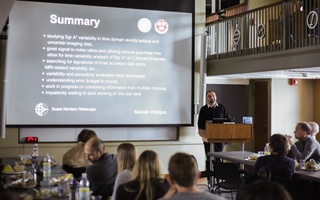Harvard’s newly formed Black Hole Initiative received funding two weeks after world-renowned astrophysicist Stephen Hawking spoke about the initiative to a packed Sanders Theatre on April 19.
The John Templeton Foundation gave $7.2 million of funding over the next three years to the Initiative. Astronomy department chair and Director of the Black Hole Initiative Abraham “Avi” Loeb hailed this project as an “interdisciplinary” fusion of the humanities and sciences.
“The thing that makes it most attractive [for students in the sciences] is the opportunity to speak for people from humanities,” he said.
At the April 19 event Loeb spoke about the goals of the Black Hole Initiative.
“The goal is to bring these people together that otherwise do not meet very often and to cultivate a sort of culture of people interested in black holes,” Loeb said. “It’s the only center worldwide that is focused on research on black holes and because of that, Stephen Hawking made it a special priority to come here.”
Loeb said that the the Initiative received a space at 20 Garden Street, the current location of the Center for Math and Application. He said they hoped to occupy the building by the end of the summer.
History of Science professor Peter L. Galison echoed Loeb’s statement about the importance of the initiative.
“What is singular this effort is it combines history and philosophy of science with these other areas.” Galison said. "Black holes have singular feature, they have attracted the attention of people in many different disciplines.”
Galison also spoke about the "deep philosophical and cultural questions” that black holes raise.
“What if an object does something that prevents its own existence later on?” he said. “My role will be to convene philosophers from all over the world.”
Galison said he will also be “making a film about the Black Hole Initiative,” exploring the deeper philosophical questions raised by the existence.
Loeb called the grant the “largest grant awarded to the physical sciences” from the John Templeton Foundation. On its website, the Foundation describes itself as a “philanthropic catalyst for discoveries relating to the Big Questions of human purpose and ultimate reality.”
Loeb said he hoped the initiative will be “an attraction for students” who look forward to studying the “fascinating” subject.
—Staff writer Alec J. Grigorian can be reached at alec.grigorian@thecrimson.com. Follow him on Twitter @alecgator23.
Read more in News
Columbia Grad Students Receive Additional BenefitsRecommended Articles
-
FAS Highlights Pedagogy in VideosThe Faculty of Arts Sciences launched its “Great Teachers” video series Wednesday, a project which highlights pedagogy in video clips that showcase the teaching methods of prominent professors across the University.
-
Politicizing the MainstageThe norms of Harvard theater restrictively dictate where and how actors and characters of color can exist; as unintentional as it may be, the theater community at Harvard oversamples and over-represents whiteness.
-
At Black Hole Talk, Stephen Hawking Draws Massive AudienceWorld-famous theoretical cosmologist Stephen W. Hawking discussed the history of and recent breakthroughs in research on black holes at the inauguration of Harvard's Black Hole Initiative.
-
 Astronomers Discuss Black Holes, Cosmic Radiation at Luncheon
Astronomers Discuss Black Holes, Cosmic Radiation at Luncheon -
Sciences Faculty Remember Stephen HawkingHawking, who died last Wednesday at the age of 76, was a renowned English theoretical physicist and cosmologist.













